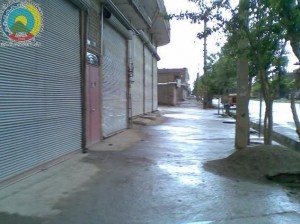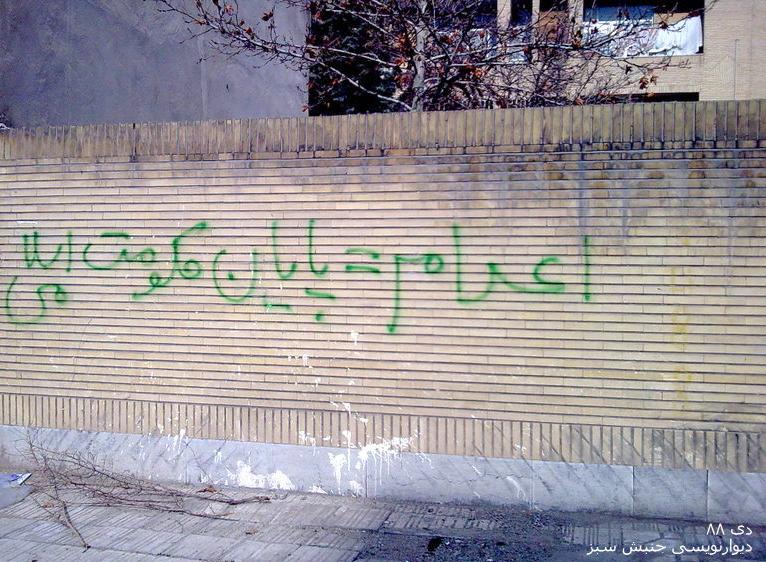The Latest from Iran (22 May): Karroubi's Letter, University Protests
 Saturday, May 22, 2010 at 15:55
Saturday, May 22, 2010 at 15:55 [youtube]http://www.youtube.com/watch?v=Jc4Wc0JSzOc[/youtube]
1530 GMT: University Protest. Radio Free Europe/Radio Liberty reports, from an unnamed student source, "Basij forces at the university attacked protesting students and injured several of them....Students were chanting 'Death to the Dictator' and 'Ya Hossein, Mir Hossein'."
NEW Iran Nuke Analysis: Reading the US-Turkey Discussions
Iran Analysis: Four Perspectives on the Uranium-Sanctions Dance
The Latest from Iran (21 May): Friday Rest?
1515 GMT: University Protest. Reports are coming through of a demonstration at Azad University in Tehran today, with "several hundred" chanting against the continued detention of fellow students. Human Rights Activists News Agency claims there was a heavy security presence, with possible arrests. The claimed video:
[youtube]http://www.youtube.com/watch?v=0vC8K-kjAzQ[/youtube]
1110 GMT: Karroubi's Letter. The Associated Press has picked up on Mehdi Karroubi's latest intervention, in a letter to Ayatollah Mousavi Ardebili (see 0645 GMT):
The judiciary, which...is required under the constitution to defend constitutional freedoms of the citizens, has become an instrument in the hands of the ruling system and security and military agencies. Instead of providing security to the people, the judiciary has turned to intimidation and imprisonment....
The present head of government [Mahmoud Ahmadinejad], with his strange behavior, has humiliated the Iranian nation.
0855 GMT: Sanctions Deals? In a separate entry, Ali Yenidunya looks at the tension in US-Turkish relations around this week's Iran-Turkey-Brazil agreement on the process for uranium enrichment talks.
Looks like Washington may have avoided such tensions with Moscow, however, over the path to sanctions on Tehran: on Friday, the US Government lifted any punishment of three Russian entities implicated in efforts to aid Iran's nuclear weapons and missile programmes.
0845 GMT: Rafsanjani Watch (cont.). The "hardline" journalist Fatemeh Rajabi has pronounced that Hashemi Rafsanjani's interpretation of Islamic rule is like "the time of the Shah".
0810 GMT: Economy Watch. This may be the most revealing statement in some time on the challenges to Iran's government. General Hassan Firouzabadi, who is a well-known economic expert as the head of Iran's armed forces, issued this declaration when he introduced Tehran Friday Prayers: "Reformists are responsible for the people's economic problems."
0750 GMT: Noticing. A burst of attention in the US media to internal affairs in Iran. William Yon and Michael Slackman write in The New York Times, "As Iran approaches the first anniversary of a contested presidential election that touched off a deep political crisis, opposition supporters remain under intense pressure, with student leaders [Bahareh Hedayat and Milan Asadi] receiving long prison terms and a prominent opposition politician [Mohammad Ali Abtahi] and a filmmaker being attacked."
(I leave it for readers to consider whether the recent attack by the authors of Race for Iran on Nazila Fathi of the Times has actually spurred the newspaper to maintain its focus on the Government pressure before the 12 June anniversary.)
The Los Angeles Times picks up on the "bad hijab" campaign. It adds to our review of Ayatollah Jannati's Friday Prayer sermon in Tehran and then turns to Ayatollah Ahmad Alam-al-Hoda in Mashhad:
Badly veiled women and girls are like foot soldiers of the United States. Our enemies intend to pull the rug of religion from under the feet of our youth by spreading bad veil in the society. Anytime badly veiled women and girls sport strong makeup to deviate a young man from the right path, the enemy will be pleased with victory.
0745 GMT: Political Prisoner Watch. Journalist and filmmaker Mohammad Nourizad has been relocated to Evin Prison's general ward, but he says he will continue his hunger strike until a verdict is issued and he is freed.
0740 GMT: The Students Fast. Azad University students, despite pressure from intelligence agents, observed a one-day political fast on Wednesday to mark the 100th day of student Ali Malihi’s detention. The fast was broken on Thursday in an Iftar ceremony outside Evin Prison.
0735 GMT: Rafsanjani Watch. Mohammad Hashemi, a member of the Expediency Council and brother of Hashemi Rafsanjani, has again declared --- citing Ayatollah Khomeini --- "If people are not satisfied by a Government, the nezam [Iranian system] lacks acceptance."
0725 GMT: Rahnavard Speaks. Le Monde publishes an interview with Zahra Rahnavard, activist and wife of Mir Hossein Mousavi, who declares, "Victory will come one day to the Iranian people," and links the Green and women's movements:
[This] is a movement that has echoes claims of the Iranian people that actually date back to over a hundred years, the Constitutional Revolution of 1906. And the presidential election was an opportunity to remember: freedom, rule of law, democracy. The Green Movement does not want the regime to fall; what it wants is reform. It comes from civil society and peaceful means. I repeat, peaceful, even if the regime has no shortage of weapons and uses violence.
This movement is expressed in various ways through meetings, rallies, civil society, and literary and artistic expressions. All components of society are represented: teachers, workers, athletes, artists, representatives of ethnic minorities....Women, who represent half of the population, and students have played a special role and have an important place within the movement.
My message to Iranian women is, "Move on, raise your level of knowledge and studies to be eventually accepted as full citizens." I campaign for it and against polygamy, violence, and decades of discrimination. Iranian women have no choice; they must continue the fight.
0645 GMT: Karroubi Intervenes. The morning starts with news of a long letter from Mehdi Karroubi to Ayatollah Mousavi Ardebili.
Much of the letter is Karroubi's well-known call for justice and responsibilty. He harshly condemns the violation of the Islamic Republic's Constitution and wonders who will defend it: the Parliament is not serving as a representative of the public and the judiciary is not defending people's rights. Karroubi also complains about the "destruction of revolutionary personalities", economic decline, and the President's lack of diplomacy, "which has led to the humiliation of the Iranian people".
There is a twist, however. Karroubi defends the late Ayatollah Khomeini and Mir Hossein Mousavi against recent accusations that they accepted executions in the 1980s.
An EA correspondent evaluates, "."With Mousavi and Khomeini being accused of accepting executions during their rule, criticism has reached the core of this Iranian system. Although Karroubi defends him and Khomeini, he also complains that those incidents were never investigated. Clever tactics, declaring himself as the most acceptable Green candidate. In any case the genie is out of the bottle."
 Ali Yenidunya,
Ali Yenidunya,  Ayatollah Abdolkarim Mousavi Ardabili,
Ayatollah Abdolkarim Mousavi Ardabili,  Ayatollah Ahmad Alam-al-Hoda,
Ayatollah Ahmad Alam-al-Hoda,  Ayatollah Ahmad Jannati,
Ayatollah Ahmad Jannati,  Ayatollah Ruhollah Khomeini,
Ayatollah Ruhollah Khomeini,  Azad University Tehran,
Azad University Tehran,  Bahareh Hedayat,
Bahareh Hedayat,  Bani Akram University,
Bani Akram University,  Fatemeh Rajabi,
Fatemeh Rajabi,  Green Movement,
Green Movement,  Hashemi Rafsanjani,
Hashemi Rafsanjani,  Hassan Firouzabadi,
Hassan Firouzabadi,  Human Rights Activists News Agency,
Human Rights Activists News Agency,  Iran,
Iran,  Le Monde,
Le Monde,  Mahmoud Ahmadinejad,
Mahmoud Ahmadinejad,  Mehdi Karroubi,
Mehdi Karroubi,  Michael Slackman,
Michael Slackman,  Milan Asadi,
Milan Asadi,  Mir Hossein Mousavi,
Mir Hossein Mousavi,  Mohammad Ali Abtahi,
Mohammad Ali Abtahi,  Mohammad Hashemi,
Mohammad Hashemi,  Mohammad Nourizad,
Mohammad Nourizad,  Nazila Fathi,
Nazila Fathi,  Race for Iran,
Race for Iran,  Radio Free Europe,
Radio Free Europe,  Radio Liberty,
Radio Liberty,  Russia,
Russia,  Turkey,
Turkey,  William Yon,
William Yon,  Women's Rights,
Women's Rights,  Zahra Rahnavard in
Zahra Rahnavard in  Middle East & Iran
Middle East & Iran 





